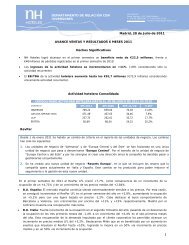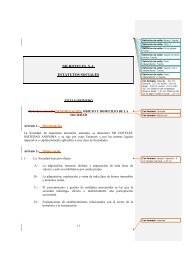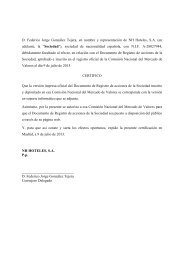Download Complete PDF - Informe Anual 2012
Download Complete PDF - Informe Anual 2012
Download Complete PDF - Informe Anual 2012
You also want an ePaper? Increase the reach of your titles
YUMPU automatically turns print PDFs into web optimized ePapers that Google loves.
a) The transformation of listed companies into holding companies through “subsidiarisation” or the incorporation of essential activities into<br />
subsidiary entities, which to date were carried out by the company itself, even though the parent maintains full control over them;<br />
b) The acquisition or disposal of essential operational assets when this involves an effective modification of the corporate purpose;<br />
c) Operations equivalent to effectively winding up the company.<br />
Partially complies<br />
The amendment of the articles approved by the General Shareholders’ Meeting on 29 June 2011 expressly included the transactions mentioned in sections<br />
b) and c) of this Recommendation as matters to be submitted to the General Meeting for its approval. This does not apply to the transactions described in<br />
section a).<br />
4. Detailed proposals of the resolutions to be adopted by the General Shareholders’ Meeting, including the information referred to in Recommendation<br />
28, should be published at the same time as the announcement of the General Meeting is published.<br />
Complies<br />
5. The General Shareholders’ Meeting votes separately on those subjects that are essentially independent so that shareholders are able to exercise their<br />
voting preferences separately. And that this rule is applied, particularly to:<br />
a) The appointment or ratification of directors, who must be voted for individually;<br />
b) In the event of amendments to the bylaws, to each essentially independent article or group of articles.<br />
See section: E.8<br />
Complies<br />
6. Companies allow split votes, so that financial intermediaries that legitimately appear as shareholders, but are acting on behalf of different clients, can<br />
cast their votes according to their clients’ instructions.<br />
See section: E.4<br />
Complies<br />
7. The Board carries out its functions with a unity of purpose and independent criteria, treating all shareholders equally, guided by the interests of the<br />
company, which is understood to be the constant maximisation of the financial value of the company. It should also ensure that the company respects<br />
all laws and regulations in its dealings with stakeholders; fulfils its obligations and contracts in good faith; respects the customs and good practices of<br />
the sectors and territories in which it operates; and observes the principles of social responsibility to which it has voluntarily subscribed.<br />
Complies<br />
8. The principal objective of the Board should be to approve the Company’s strategy and the organisational requirements for implementing the same,<br />
as well as to supervise and control management to ensure it achieves the objectives set and fulfils the company’s objectives and corporate purpose.<br />
Therefore, the plenary sessions of the Board reserves the authority to approve:<br />
a) The general strategies and policies of the company, in particular:<br />
i) The strategic or business plan, as well as management objectives and annual budgets;<br />
ii) The investment and financing policy;<br />
iii) The definition of the corporate group structure;<br />
iv) The corporate governance policy;<br />
v) The corporate social responsibility policy;<br />
vi) The policy on remuneration and performance evaluations of senior managers;<br />
vii) The risk control and management policy, as well as the periodic monitoring of internal information and control systems;<br />
viii) The dividend policy, and also treasury stock policy and limits.<br />
See sections: B.1.10, B.1.13, B.1.14 and D.3<br />
b) The following decisions:<br />
i) The appointment and removal of senior managers, as well as their compensation clauses, as proposed by the Chief Executive Director of the<br />
company;<br />
See section: B.1.14<br />
ii) The remuneration of directors and, in the case of executives, the additional remuneration for their executive functions and other conditions<br />
that are to be respected in their contracts;<br />
See section: B.1.14<br />
iii) The financial information that, by virtue of being a listed company, the company must periodically make public;<br />
iv) The investments or transactions of any kind that, on account of their high value or special characteristics, are of a strategic nature, unless it<br />
is the responsibility of the General Meeting to approve them;<br />
v) The creation or acquisition of shareholdings in special purpose vehicles or those registered in countries or territories considered tax havens,<br />
as well as other similar transactions or operations that, due to their complexity, could impair the transparency of the group.<br />
c) Operations that the company may carry out with directors, significant shareholders or those represented on the Board, or with any person<br />
related to them (“related party transaction”). <br />
ANNUAL CORPORATE GOVERNANCE REPORT 49
















